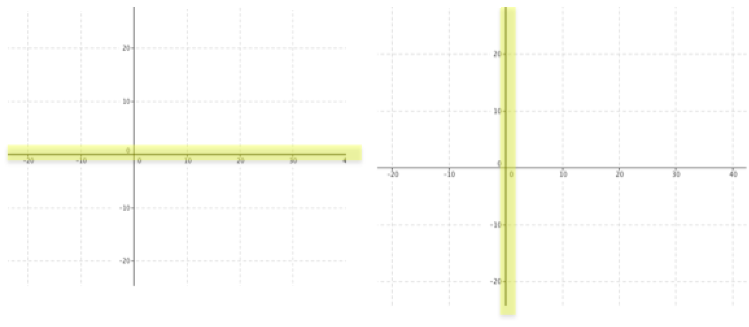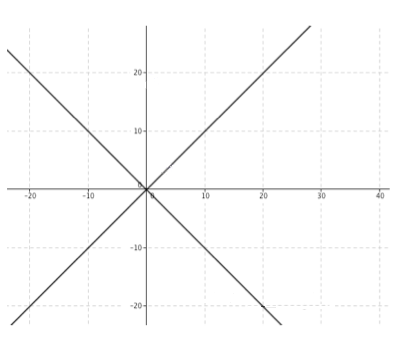Skip over navigation


Or search by topic
Number and algebra
Geometry and measure
Probability and statistics
Working mathematically
Advanced mathematics
For younger learners
Complex Squares
Age 16 to 18
Challenge Level 





- Problem
- Getting Started
- Student Solutions
- Teachers' Resources
Ramana from Camilla Road Senior Public School has shown that if a complex number a+bi is not real, then it must be purely imaginary for its square to be a real number:
$(a+bi)^2 = a^2+2abi+(bi)^2$.
Suppose b is not 0. Then if a does not equal 0, the imaginary part of this, 2abi, will not be zero. So we must have $a = 0$.
Now the only term remaining is $(bi)^2$. This is equal to $b^2 * i^2$, giving $-b^2$ which is a real number.
Example:
$(0+2i)^2 = -4$.
Robert James from Easingwold Secondary School has thought about this too, as well as which complex numbers square to give imaginary numbers:
If we say that $z + yi (Z_2)$ is the square of $a +bi (Z_1)$:
$z+yi = (a+bi)^2$
so $z+yi = a^2+2abi+(bi)^2$
and then $z+yi = a^2+2abi- b^2$
We can draw from this that $z=a^2 -b^2$ and $y=2ab$.
$Z_2$ will only be real when a or b is 0. This makes sense: as shown earlier z = $a^2 -b^2$ and $y=2ab$, so, for y to be zero (which we need because it is the coefficient of i) either a or b (or both) must be zero. Represented on an Argand diagram:

When a is zero, $a^2+2abi -b^2$ is reduced to $-b^2$, and when b is zero it is reduced to $a^2$. This means that if b is zero the squared number will be positive and if a is zero it will be negative.
For $Z_2$ to be imaginary a and b have to be equal or the negative version of the other. This is because the real part of $a^2+2abi-b^2$ is $a^2 -b^2$. So for this to equal zero, $a^2$ must equal $b^2$. On an Argand diagram:

If a and b are equal, 2ab will be positive and so the imaginary coefficient will be positive. However, if one is the negative version of the other $2ab$ will be negative and so the coefficient will be too.
If you have any other solutions or conjectures to this problem, please send them in!
$(a+bi)^2 = a^2+2abi+(bi)^2$.
Suppose b is not 0. Then if a does not equal 0, the imaginary part of this, 2abi, will not be zero. So we must have $a = 0$.
Now the only term remaining is $(bi)^2$. This is equal to $b^2 * i^2$, giving $-b^2$ which is a real number.
Example:
$(0+2i)^2 = -4$.
Robert James from Easingwold Secondary School has thought about this too, as well as which complex numbers square to give imaginary numbers:
If we say that $z + yi (Z_2)$ is the square of $a +bi (Z_1)$:
$z+yi = (a+bi)^2$
so $z+yi = a^2+2abi+(bi)^2$
and then $z+yi = a^2+2abi- b^2$
We can draw from this that $z=a^2 -b^2$ and $y=2ab$.
$Z_2$ will only be real when a or b is 0. This makes sense: as shown earlier z = $a^2 -b^2$ and $y=2ab$, so, for y to be zero (which we need because it is the coefficient of i) either a or b (or both) must be zero. Represented on an Argand diagram:

When a is zero, $a^2+2abi -b^2$ is reduced to $-b^2$, and when b is zero it is reduced to $a^2$. This means that if b is zero the squared number will be positive and if a is zero it will be negative.
For $Z_2$ to be imaginary a and b have to be equal or the negative version of the other. This is because the real part of $a^2+2abi-b^2$ is $a^2 -b^2$. So for this to equal zero, $a^2$ must equal $b^2$. On an Argand diagram:

If a and b are equal, 2ab will be positive and so the imaginary coefficient will be positive. However, if one is the negative version of the other $2ab$ will be negative and so the coefficient will be too.
If you have any other solutions or conjectures to this problem, please send them in!
You may also like
A Brief Introduction to Complex Numbers
In this problem, we define complex numbers and invite you to explore what happens when you add and multiply them.
A Brief Introduction to the Argand Diagram
Complex numbers can be represented graphically using an Argand diagram. This problem explains more...

